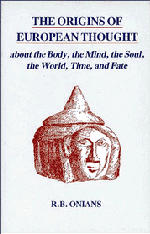Book contents
- Frontmatter
- Contents
- Preface to the first edition
- Preface to the second edition
- Introduction: The Earliest Greeks
- PART I THE MIND AND THE BODY
- PART II THE IMMORTAL SOUL AND THE BODY
- Chapter I The ψυχή
- Chapter II The Genius, Numen, etc.
- Chapter III Anima and Animus
- Chapter IV The Knees
- Chapter V The Strength
- Chapter VI The Stuff of Life
- Chapter VII River-Worship and some Forms of the Life-substance
- Chapter VIII The World: Beginnings of Greek ‘Philosophy’
- Chapter IX Death and Cremation
- Chapter X The Offerings to the Dead and to the Gods
- Chapter XI Nectar and Ambrosia
- PART III FATE AND TIME
- ADDENDA
- Indexes
- Frontmatter
- Contents
- Preface to the first edition
- Preface to the second edition
- Introduction: The Earliest Greeks
- PART I THE MIND AND THE BODY
- PART II THE IMMORTAL SOUL AND THE BODY
- Chapter I The ψυχή
- Chapter II The Genius, Numen, etc.
- Chapter III Anima and Animus
- Chapter IV The Knees
- Chapter V The Strength
- Chapter VI The Stuff of Life
- Chapter VII River-Worship and some Forms of the Life-substance
- Chapter VIII The World: Beginnings of Greek ‘Philosophy’
- Chapter IX Death and Cremation
- Chapter X The Offerings to the Dead and to the Gods
- Chapter XI Nectar and Ambrosia
- PART III FATE AND TIME
- ADDENDA
- Indexes
Summary
The head, we have seen, was holy, as being seat and source of the ‘life’ and the life fluid. The knees too have sanctity, though it has attracted little notice and has not been explained. The suppliant regularly clasps and appeals to them. To ask a favour in return for her rescue of him Thetis sat down before enthroned Zeus and ‘clasped his knees with her left hand and with her right took hold of him by the chin beneath’. ‘This act’, it is suggested, ‘perhaps symbolises the last resource of the disarmed and fallen warrior who can only clasp his enemy's legs to hamper him and turn aside his face so that he cannot see to aim the final blow until he has at least heard the prayer for mercy.’ Were this really a symbolism based upon the action of a ‘disarmed and fallen warrior’ threatened by a standing or onrushing foe, imagination would show us a nimble long-armed victim clasping at once the knees and chin of an obligingly passive conqueror whose legs are more dangerous than his arms. There is in fact no hint here or elsewhere of turning aside the face, and the legs of sitting Zeus on this occasion scarcely called even for ‘symbolic’ hampering. Hera tells us just that Thetis ‘kissed his knees and took his chin in her hand’.
- Type
- Chapter
- Information
- The Origins of European ThoughtAbout the Body, the Mind, the Soul, the World, Time and Fate, pp. 174 - 186Publisher: Cambridge University PressPrint publication year: 1988

